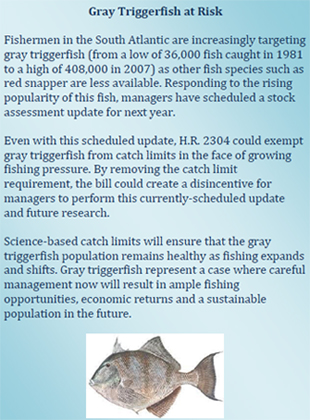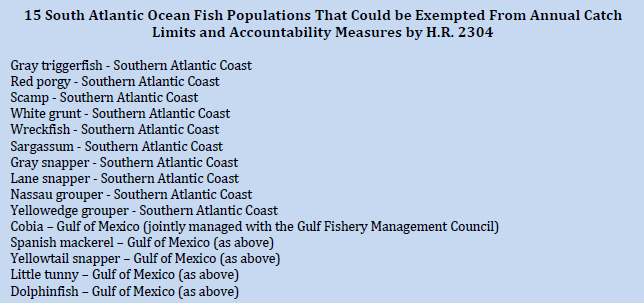H.R. 2304: A Bill that Would Weaken Fisheries Science and Undermine Efforts to Prevent Overfishing in the South Atlantic

Congress should reject H.R. 2304 because it would undermine the progress we've made in preventing overfishing for some of America's most valuable and vulnerable ocean fish populations.
The Magnuson-Stevens Fishery Conservation and Management Act, the federal law that governs management of our nation's ocean fish, requires managers to set science-based annual catch limits (ACLs) to ensure sustainable fishing for all federally-managed ocean fish populations by the end of 2011. The misnamed "Fishery Science Improvement Act" would jeopardize this goal and put economically and environmentally important species such as red porgy and gray triggerfish at risk by undermining the ACL requirement. Specifically, H.R. 2304 would:
- Exempt managers from setting science-based catch limits for fish populations that have not been assessed in the past five years. This exemption could risk overfishing on at least 15 of the most commercially and recreationally-valuable fish in the South Atlantic. It would also exempt managers from using scientifically valid methods for establishing catch limits based on existing and readily available information such as the biology of the species and recent commercial and recreational catch data.
- Create a new loophole that could allow the Secretary of Commerce to exempt scores of fish species from the requirements to establish science-based catch limits, including those that are undergoing overfishing. H.R. 2304 would establish a new, ill-defined category of fish populations known as "ecosystem stocks" that are exempt from catch limits.
- Extend the deadline to set catch limits that prevent overfishing to 2014, putting vulnerable fish populations at risk. We know from experience that "kicking the can down the road" and risking overfishing can have disastrous consequences on our nation's fish populations and fishing communities. South Atlantic red snapper is a case in point. Managers unwittingly allowed overfishing of South Atlantic red snapper for 50 years, reducing the breeding population to 11-14 percent of what scientists consider a healthy level.
Thanks to the ACL requirements requirements of the Magnuson-Stevens Act, managers have steadily improved data collection and analysis for species that have historically lacked assessments because they are not commercially valuable or are small fisheries. H.R. 2304 would undermine this progress by taking away the incentive for managers to collect information on these fish populations. Instead, they will likely allocate their scarce research funds to those species where they are legally required to set a limit.
Congress took decisive bipartisan action in 2006 to end decades of overfishing and restore our nation's valuable fish populations by strengthening the Magnuson-Stevens Fishery Conservation and Management Act. H.R. 2304 undermines science-based management and puts vulnerable fish populations at risk just as we are nearing the finish line of ending and preventing overfishing for all federally-managed fish populations, including those in the South Atlantic. Congress should reject this short-sighted bill and instead help improve fisheries science by investing in fisheries data collection and monitoring programs.

Sources:
National Marine Fisheries Service Marine Recreational Fisheries Statistics, query date 19 July 2011,
NOAA Southeast Fisheries Science Center, 2010. "Southeast Data, Assessment and Review (SEDAR) 24 - Stock Assessment Report 1, South Atlantic Red Snapper. Section I, p. 9. http://www.sefsc.noaa.gov/sedar/Sedar_Workshops.jsp?WorkshopNumber=24,
National Marine Fisheries Service (NMFS), "2011 Status of U.S. Fisheries: First Quarter Update," Mar. 31, 2011, www.nmfs.noaa.gov/sfa/statusoffisheries/SOSmain.htm,
NMFS, Species Information Susten Public Portal. https//www.st.nmfs.noaa.gov/sisPortal/sisPortalMain.jsp., accessed June 25, 2011; and personal communication with NMFS personnel.











